Listen:
Check out all episodes on the My Favorite Mistake main page.
My guest for Episode #303 of the My Favorite Mistake podcast is Kason Morris, a corporate executive, speaker, coach, and self-described life-work revolutionary. With a career that spans consulting, financial services, and global learning and development leadership, Kason has spent years helping organizations and individuals prepare for the rapidly evolving world of work. He’s also the author of LifeWork Revolution: How to Unplug from the System, Find Your Purpose, and Thrive Beyond the 9 to 5.
Kason’s “favorite mistake” was what he calls the relentless climb—his belief that success was defined by job titles, constant hustle, and chasing the next promotion. While his resume showed success, his health, relationships, and sense of fulfillment told a different story. A powerful turning point came when his young daughter mimicked his busy, distracted behavior at home—forcing him to ask: Is this the version of myself I want to model? From that moment, Kason began a process of reflection and reinvention, applying design thinking to life and work.
Mark and Kason explore topics like life-work synergy vs. work-life balance, how AI is reshaping the future of work, and why psychological safety and transparency are foundational for sustainable innovation. Whether you're a burned-out professional, a leader trying to engage your team, or someone curious about navigating change, this conversation offers inspiring lessons about slowing down, designing better systems, and living more intentionally.
Questions and Topics:
- What is your “favorite mistake,” and why does it stand out to you?
- When did you first realize that your definition of success might be off track?
- What roles or promotions were part of that “relentless climb” in your career?
- Did you receive feedback from your family, or was your shift more self-reflective?
- What was the moment with your daughter that became a wake-up call?
- How did you start making changes after that realization?
- What does the phrase “designing a better life” mean to you in practice?
- How did your professional experiences in product and organizational design influence your life design approach?
- What is “life-work synergy,” and how is it different from work-life balance or integration?
- How did your new perspective influence your transition into your current role?
- How do you define the “future of work,” and what are the key capabilities people need to thrive in it?
- What are your thoughts on AI—especially how individuals can partner with it effectively?
- What are some common mistakes people or companies make when approaching AI and new technologies?
- What’s your take on the return-to-office debate and how it fits into the future of work?
- Why is employee experience becoming such a critical focus for organizations?
- What advice do you have for individuals trying to future-proof their careers?
- What do organizations need to do culturally to foster innovation and engagement?
- In your coaching practice, who typically reaches out to you—and how can they learn more?
Scroll down to find:
- Video version of the episode
- How to subscribe
- Quotes
- Full transcript
Find Kason on social media:
Video of the Episode:
Quotes:
Click on an image for a larger view
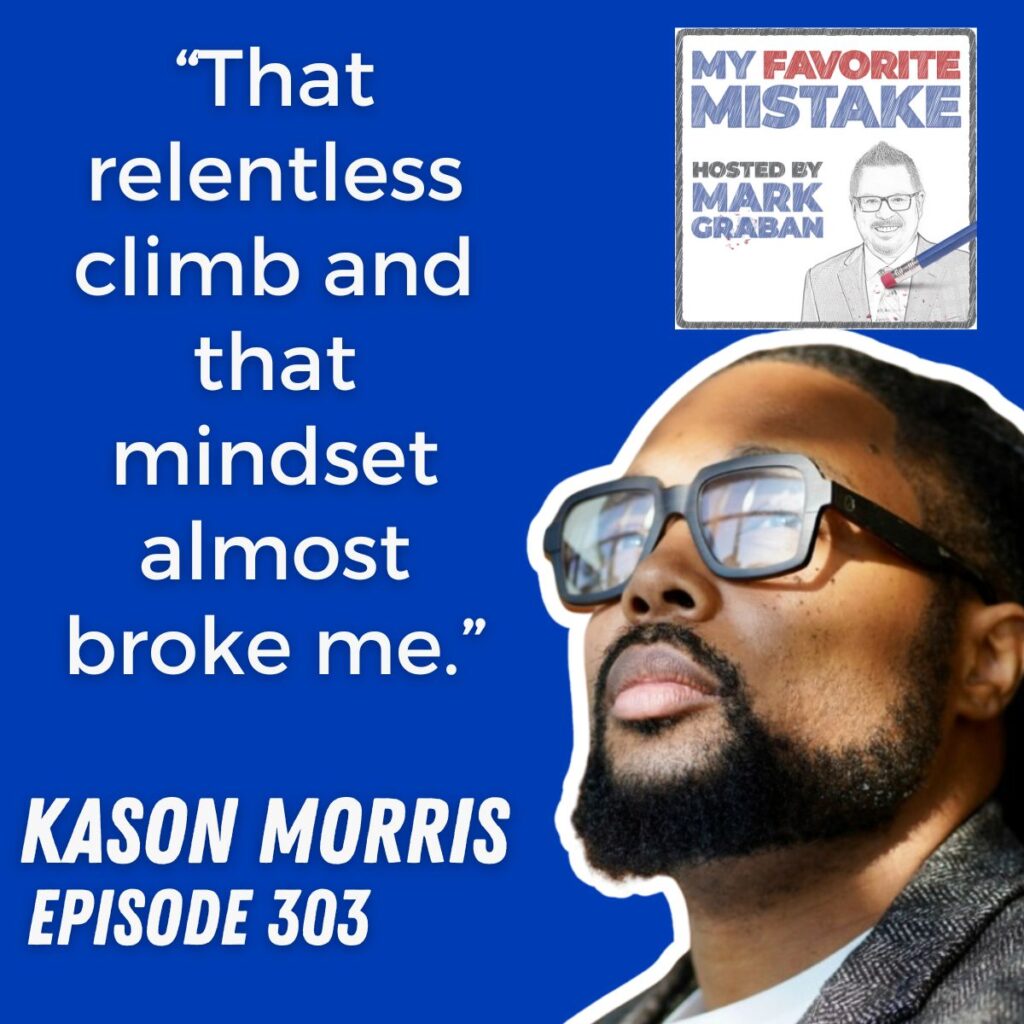
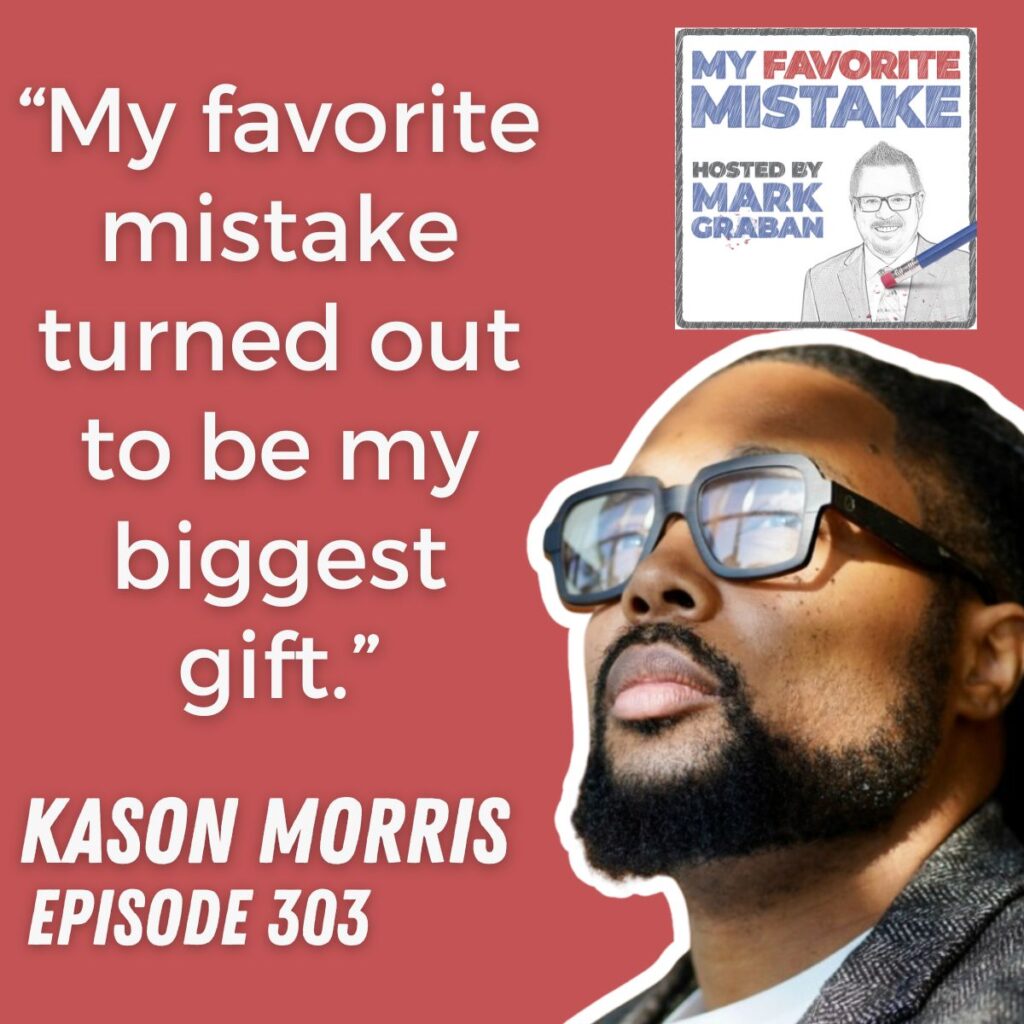
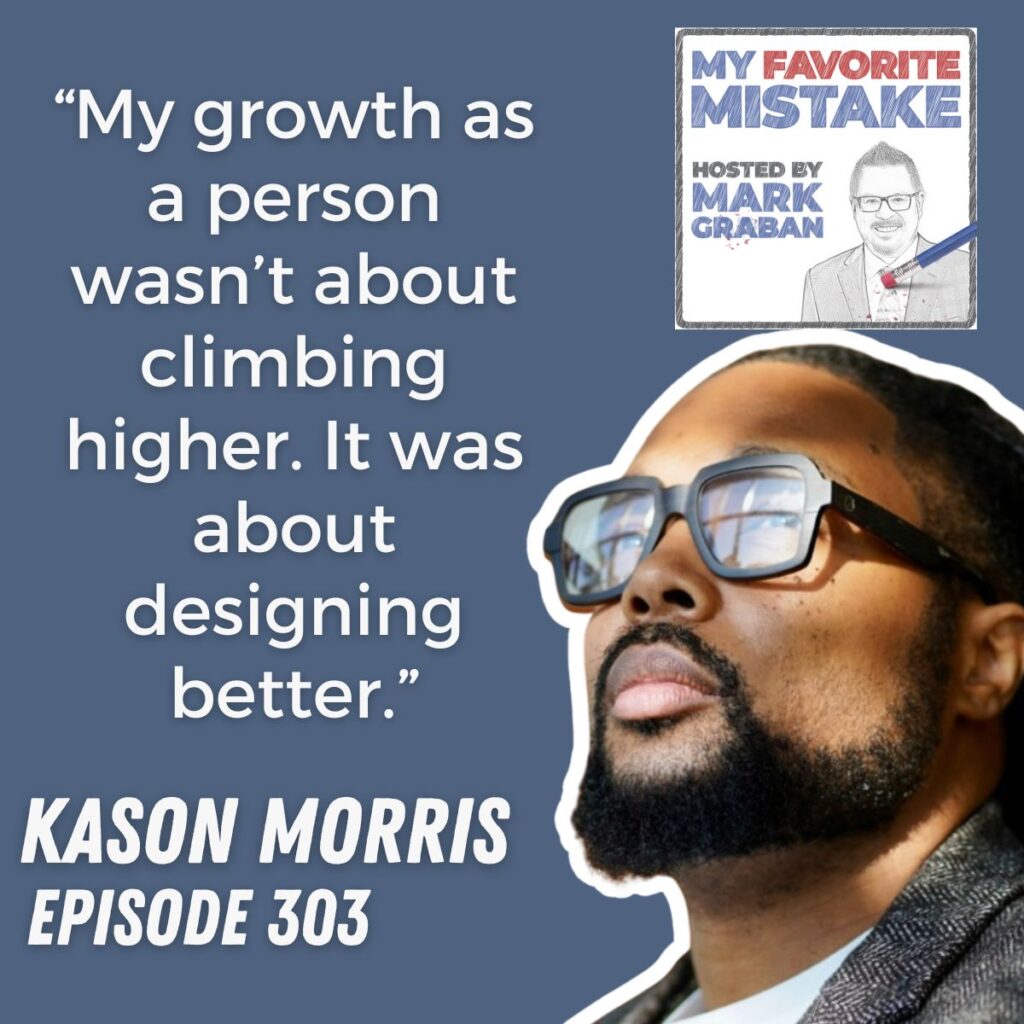
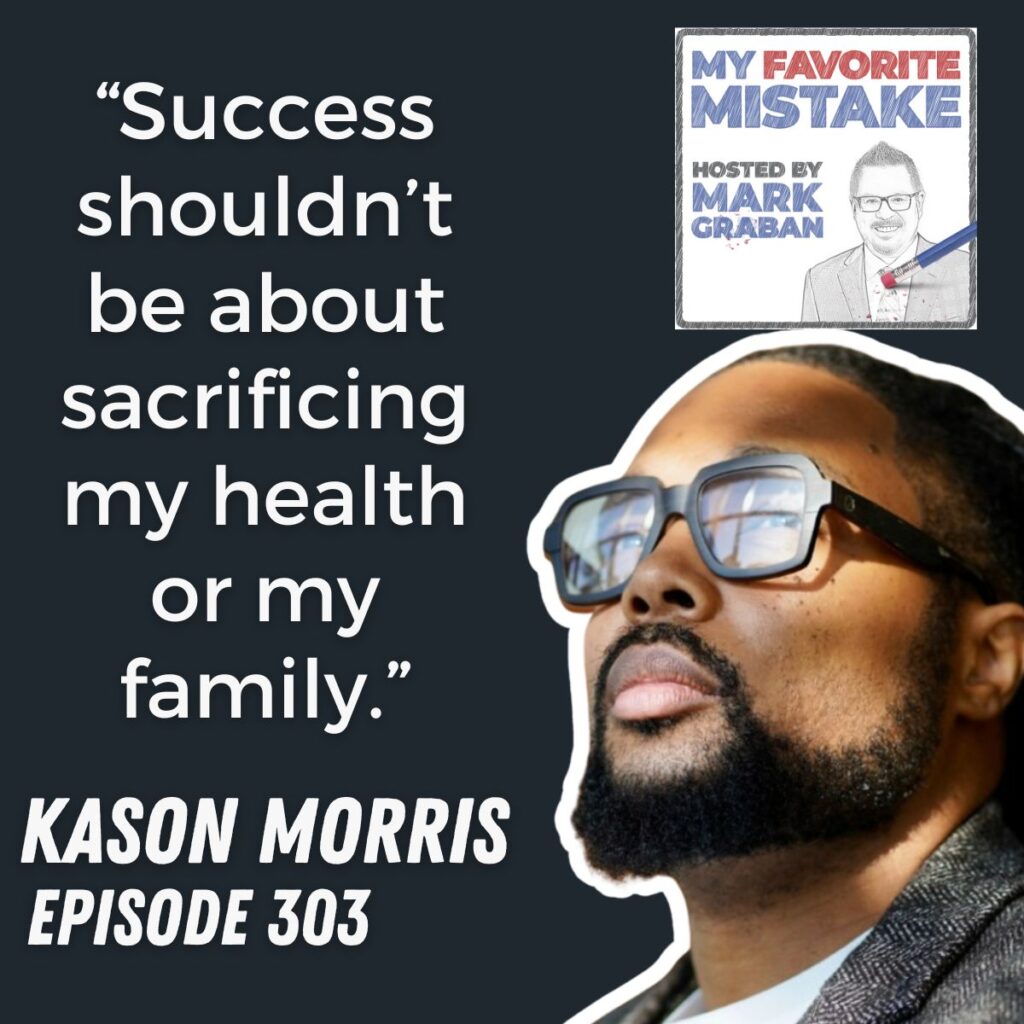
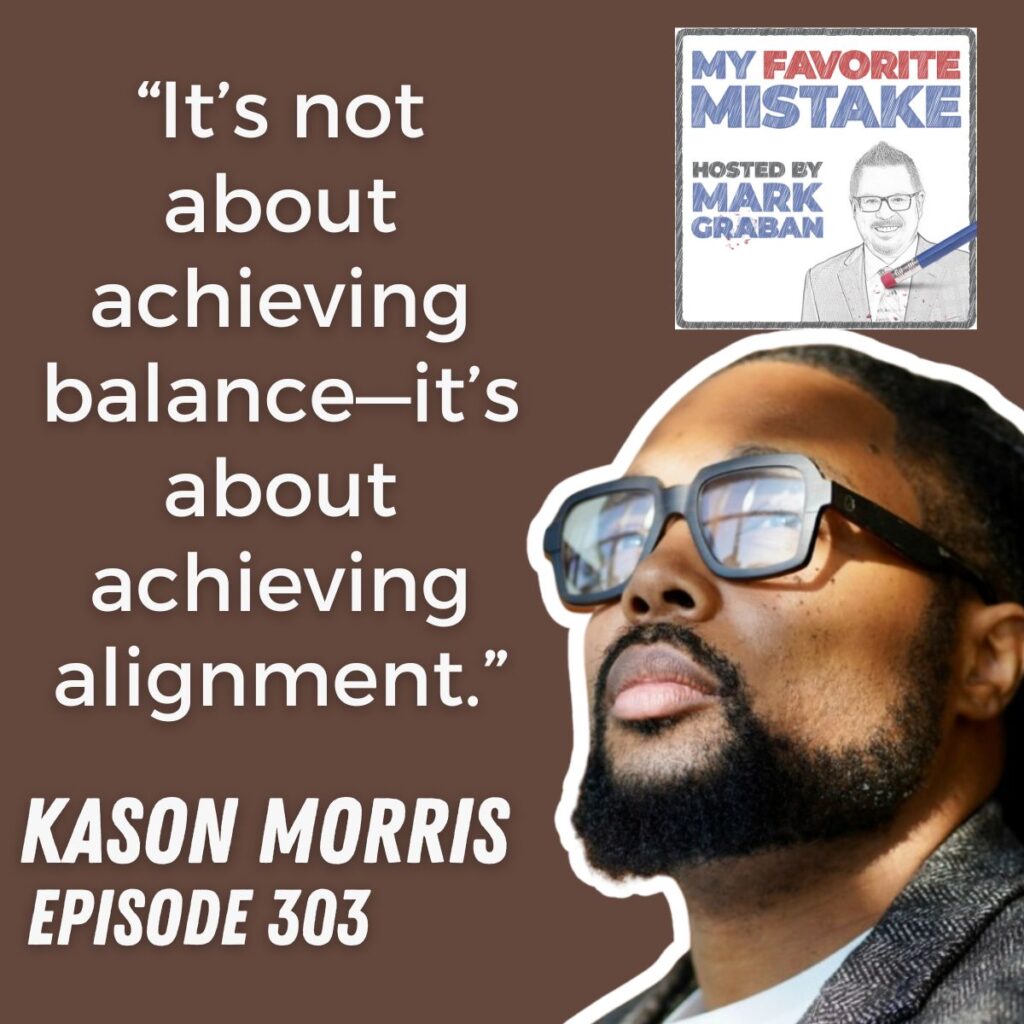
Subscribe, Follow, Support, Rate, and Review!
Please follow, rate, and review via Apple Podcasts, Podchaser, or your favorite app — that helps others find this content, and you'll be sure to get future episodes as they are released weekly. You can also financially support the show through Spotify.
You can now sign up to get new episodes via email, to make sure you don't miss an episode.
This podcast is part of the Lean Communicators network.

Other Ways to Subscribe or Follow — Apps & Email
Automated Transcript (May Contain Mistakes)
Mark Graban:
Hi, welcome to My Favorite Mistake. I'm your host, Mark Graban. Our guest today is Kason Morris. He describes himself as a life-work revolutionary. He's the leader of the future of work and skill strategy in a life sciences company, where he's a corporate executive.
Mark Graban:
But he also specializes in helping people transform careers and workplaces, in the evolving or revolving landscape of work, career development, and leadership. Kason has a master's degree from NYU, where he studied in a multidisciplinary program covering business, workplace education, and organizational behavior. So, Kason, welcome to the podcast. How are you?
Kason Morris:
I'm great. Thank you so much for having me and for talking about such an interesting topic like your favorite mistake. I'm really glad to be here.
Mark Graban:
Yeah, well, it's great to have you here. There's a lot to talk about, but we'll jump right in. From the different things you've done in your work and in your career—Kason, what's your favorite mistake?
Kason Morris:
I would say my favorite mistake, I would characterize it as the relentless climb. It was that idea that, several years ago in my career, I believed that success was determined by how fast you could climb the corporate ladder. So I thought about more promotions, more money, more recognition—those were the ultimate goals. And frankly, I was dead wrong.
Kason Morris:
That relentless climb and that mindset almost broke me.
Mark Graban:
So when did you start thinking that you might be wrong—or even a little wrong?
Kason Morris:
Around that time, I realized that I had many things happening outside of work. The stakes were pretty high for me. I had my second daughter on the way. I felt that weight of responsibility coming from very humble beginnings. I didn’t have any backup plan.
Kason Morris:
So that climb was like: keep going further, keep driving, keep pushing. I put pressure on myself to overdeliver, constantly striving for the next promotion. And that came at the expense of my health, my well-being, and some of my relationships. It was at that moment when I realized I was creeping toward burnout. I started missing really important moments with my family, my health was deteriorating, and I was feeling this emptiness inside—even though everything on paper looked like it was going well.
Mark Graban:
Could you tell us—maybe share some examples of the career path you had? What were some of those promotions or roles? It sounds like for a while you were living that dream. Paint the picture for us of what some of those roles were.
Kason Morris:
Yeah. So after college—and after my master’s program at NYU—I got into consulting and professional services. The beauty of consulting is the diversity. You get to access and solve really great client challenges, all kinds of problems. You get to travel, do all those things most young professionals want to do, and you learn a lot about business.
Kason Morris:
From there, I spent quite a few years in consulting. Then I went into independent consulting on my own for a little while in the financial services realm. I had the pleasure of doing talent and organizational performance work across a variety of industries. Starting in professional services gave me access to different sectors, and then I focused more heavily on financial services for a bit.
Kason Morris:
After that, I went back into professional services in a full-time role—managing a team and building learning and development functions. That was one of the places where I started realizing, “Hey, I want to do more.” I wanted to keep growing my span of control. These were the kinds of things that looked great on paper. I got a lot of experiences and exposure, but I didn’t have a strong why. I just kept pushing—because pushing was what I knew how to do.
Kason Morris:
But I wasn’t thinking about how it aligned with what I actually wanted in life.
Mark Graban:
Did you get feedback from your family about this? I’m thinking of a previous guest who had a child call them out for working too much or being unavailable. Did you get any feedback like that, or was it more self-reflection?
Kason Morris:
It was more self-reflection. I realized I was missing dinners. Instead of winding down in the evenings with my partner and kids, I would get back on the computer after dinner and work on more projects—trying to stay ahead of the curve.
Kason Morris:
One telling moment was when one of my daughters mimicked what she thought I was doing as an employee. She said, “This is when Daddy goes to work,” and she was typing on a keyboard, on the phone, doing all these different things. That moment hit me. I thought, “Wow, this is the image she has of me.” And that was a huge wake-up call. That’s not the version of myself I want her to see or imitate. That was when I knew I had to make a change.
Mark Graban:
Yeah, it sounds like she was mimicking the multitasking—the executive-style chaos of juggling calls, meetings, emails. She picked up on that?
Kason Morris:
Yep, absolutely. And around this time, it became a real turning point for me. I realized that my talents and my sense of worth weren’t tied to my job title. Success shouldn’t mean sacrificing my health or my family. My growth wasn’t about climbing higher—it was about designing better.
Kason Morris:
Seeing her behavior made me think, “I’ve got to design better.” That’s not the image I want to leave with her.
Mark Graban:
That’s an interesting phrase—designing better. What steps did you start to take? It sounds like this idea of “life design” is part of that journey.
Kason Morris:
Yeah, absolutely. Because of the different experiences I had across functions—like product management, marketing, operations—I started thinking about life as a system. When you think about design thinking principles, especially from product or systems design, you ask: why can’t you apply that to your life?
Kason Morris:
That’s where the concept of life design took shape for me—even before it became a widely known thing. Now there are Stanford professors and others leading that conversation. But it started for me as a way to repurpose ideas from business and apply them to myself, to coaching others, and eventually to how I lead.
Mark Graban:
So, your own reflection and the changes you made—did that also lead to shifts in your career? I’m curious how you got into your current role, which sounds quite innovative.
Kason Morris:
Yes, definitely. Let me connect the dots a bit. My favorite mistake forced me to redesign how I approached life and work. I stopped chasing titles. I started building what I call work-life synergy, where the work I did supported the life I wanted—and vice versa.
Kason Morris:
So, I used my roles in talent and org performance as a testing ground. I worked on learning and leadership development, technology enablement, building L&D functions globally. Each opportunity became a way to both deliver value and experiment with where I thought the future of work was heading.
Kason Morris:
The last couple of cycles in my executive career brought me to where we are now—with AI transforming the workplace. My role in life sciences is focused on the future of work and defining the skills and capabilities people need to thrive in this intelligence age. It’s about helping humans partner with technology, not just fear it.
Mark Graban:
You mentioned life-work synergy earlier—that really stood out. We often hear “work-life balance” or “work-life integration.” What does life-work synergy mean to you?
Kason Morris:
Great question. First off, I intentionally say life-work instead of work-life because our lives should drive our work—not the other way around. You start by defining your life principles and goals, and then you find or shape work that aligns with that. That’s the flip.
Kason Morris:
And second, the phrase work-life balance sells the false idea of equilibrium. Life doesn’t work that way. Things come in seasons. I talk about this in my book: think in terms of seasonality or like quarters in a basketball game. You know when it’s going to be a heavy work season—you plan ahead and create alignment with your partner, kids, family. That way you reduce friction and live more intentionally.
Mark Graban:
That’s a great analogy—like anticipating a busy quarter. You’re not striving for a perfect balance, you’re striving for clarity and alignment.
Kason Morris:
Exactly. And when you think in systems, like I do, you can start to design those rhythms proactively. That’s the difference between surviving and thriving.
Mark Graban:
And congrats on the book, LifeWork Revolution! I didn’t realize you had a book out. Amazon actually tried to redirect me to someone named Jason Morris. But I found it!
Kason Morris:
(Laughs) Thank you! Yeah, it launched in 2024. Outside of my executive work, I coach, speak, and run workshops. The book was a way to scale these messages—helping people future-proof their careers by taking agency, designing systems, and building those durable skills.
Mark Graban:
You mentioned coaching. Was your independent practice part of this life-work redesign as well?
Kason Morris:
Definitely. I had an earlier stint as an executive consultant after leaving formal consulting. But COVID was a turning point. I saw so many people—VPs, directors, even C-suite folks—scrambling to make sense of their careers when the world turned upside down.
Kason Morris:
At the same time, I found myself doubling my bonuses and thriving. I realized I had a framework that worked—and I needed to share it. So that sparked a new entrepreneurial push alongside my corporate work. Not everyone needs to be an entrepreneur, but entrepreneurial mindsets are key for navigating this next normal.
Mark Graban:
Let’s dig more into what you’re seeing in the future of work, especially around technology and AI. There’s a lot of fear, but also opportunity. What’s your take?
Kason Morris:
AI is definitely a buzzword right now, but it’s not new—it’s just more accessible. I tell people to think of AI tools as really smart interns. They can help you work faster, but you still have to supervise them. AI won’t replace high-skilled workers, but workers who know how to use AI effectively will absolutely replace those who don’t.
Kason Morris:
The World Economic Forum’s 2025 Jobs Report backs this up. The top skills employers want are still human-centered: analytical thinking, creativity, communication. AI literacy is on the list, but it’s about knowing how to partner with the tech, not letting it drive.
Mark Graban:
I love that analogy. When I use ChatGPT, it’s like managing an intern—you have to double-check the work, guide it, clarify the task. And sometimes it makes up quotes, which is very “intern.”
Kason Morris:
Exactly. Prompt engineering is a skill. The better you are at giving clear instructions, the more valuable the output. At both the personal and organizational level, this is about becoming more informed about your talent and the real tasks at hand.
Kason Morris:
Companies need to understand what skills are truly critical, where those skills exist, and how to align them with work that drives value. Individuals need to do the same—become aware of your own skills and how to tell that story. Use your job to experiment and build that fluency.
Mark Graban:
Let’s talk about another big trend: return-to-office mandates. What do you think companies are getting wrong?
Kason Morris:
Some companies have a clear why—and those will do well. But others are vague and will lose top talent. COVID was the world’s greatest experiment. It proved people can get work done remotely, and that presence isn’t the same as performance.
Kason Morris:
There’s definitely value in in-person time—for team-building, collaboration, relationship-building. But going into an office just to sit on Zoom calls? That’s not it. We need to rethink the purpose of offices in a way that respects people’s time and autonomy.
Mark Graban:
Yeah, the trust factor is huge. People want autonomy. If they feel micromanaged or disrespected, it breaks trust.
Kason Morris:
Absolutely. That leads into a bigger topic—employee experience. With so much tech and change, organizations have to make it easier for people to do meaningful work. Clarity, simplicity, purpose—those things matter more than ever.
Mark Graban:
One analyst I heard said that the limiting factor for AI expansion isn’t the software—it’s the chips. It takes years to scale the infrastructure. In a way, that buys us time to adjust as humans.
Kason Morris:
That’s a blessing. Historically, revolutions like the industrial age took decades to normalize. Now we’re seeing that pace double in just a few years. We need time—for systems to adapt, and for people to process what’s happening.
Kason Morris:
The idea of a “digital employee” is on the horizon—an AI that learns your culture and tasks. But it’s only as good as the system it operates in. Garbage in, garbage out. So leaders have to be thoughtful about how this is deployed.
Mark Graban:
Let’s bring it back to culture. With everything you’ve learned and led, what do organizations need to do to foster innovation and employee engagement?
Kason Morris:
It starts with transparency and trust. Employees aren’t expecting perfection. They want to know they’re on the journey with leadership—not just a cog in the machine. When people feel valued and trusted, they give you loyalty, creativity, and discretionary effort.
Kason Morris:
An employee in a great place to work should be able to reinvent themselves over and over again—without leaving the company. That requires visibility into opportunities, clarity on what “good” looks like, and systems that support their growth.
Kason Morris:
When people feel psychologically safe—when they can fail and not be punished—you unlock innovation. You create sustainability. You stop relying on a few top-down decisions and instead tap into the full capability of the workforce.
Mark Graban:
That’s powerful. And it connects beautifully with the theme of this podcast. Mistakes happen, but if we can learn and not repeat them, we grow.
Kason Morris:
Absolutely. My favorite mistake turned out to be my biggest gift. It taught me to slow down, reflect, and design a life that actually works for me. I wouldn’t trade that lesson for anything.
Mark Graban:
Again, our guest today has been Kason Morris. His new book is LifeWork Revolution: How to Unplug from the System, Find Your Purpose, and Thrive Beyond the 9 to 5. We’ll link to that in the show notes, along with his website and LinkedIn profile.
Mark Graban:
One last thing—who typically reaches out to you for coaching, and how can they learn more?
Kason Morris:
I work with a range of folks—from senior leaders to mid-career professionals who feel stuck or are looking to evolve. You can connect with me at kasonmorris.com. I’m working on new self-paced offerings and community resources as well. Anyone can reach out through my channels.
Mark Graban:
Thanks again for being here and for sharing your story, your reflections, and your wisdom.
Kason Morris:
Thank you for having me. I hope this helps people reflect on their own lives—whether they’re climbing without direction or ready to start designing what comes next.

